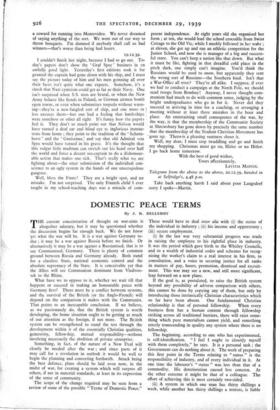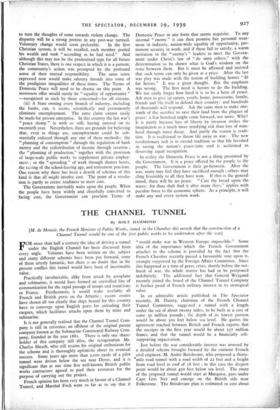DOMESTIC PEACE TERMS
By J. R. BELLERBY
THE current concentration of thought on war-aims is altogether salutary, but it may be questioned whether the discussion begins far enough back. We do not know yet what the war will be. It is a war against Germany to- day ; it may be a war against Russia before we finish. Or alternatively it may be a war against a Russianised, that is to say Communised, Germany. There is plenty of common ground between Russia and Germany already. Both stand for a classless State, national economic control and the absolute supremacy of the State. It is conceivable yet that the Allies will see Communism dominant from Vladivos- tok to the Rhine.
What have we to oppose to it, whether we wait till that happens or succeed in making an honourable peace with Germany first? There must be a conflict between systems, and the survival of the British (or the Anglo-French) will depend on the comparison it makes with the Communist. That points to an inescapable conclusion. If we believe, as we passionately do, that the British system is worth developing, the home situation ought to be getting as much of our attention as the foreign, if not more. The British system can be strengthened to stand the test through the development within it of the essentially Christian qualities, generosity, fellowship, mutual responsibility—without involving necessarily the abolition of private enterprise.
Something, in fact, of the nature of a New Deal will clearly be needed after the war ; and since parts of it may call for a revolution in outlook it would be well to begin the planning and converting forthwith. Attack being the best defence, plans should be laid even now, in the midst of war, for creating a system which will surpass all others, if not in material standards, at least in its expression of the sense of community.
The scope of the change required may be seen from a review of some of the possible " Terms of Domestic Peace." These would have to deal inter alia with (i) the status of the individual in industry ; (ii) his income and opportunity ; (iii) secure employment.
(i) In the last war very substantial progress was made in raising the employee to his rightful place in industry. It was the period which gave birth to the Whitley Councils, and to a wealth of industrial codes and schemes for recog- nising the worker's claim to a real interest in his firm, to consultation, and a voice in securing justice for all ranks in matters of pay, hours, promotion, dismissal and recruit- ment. This war may see a new, and still more significant, leap forward on a new plane.
If the goal is, as postulated, to raise the British system beyond any possibility of adverse comparison with others, this cannot be done by copying any of them, but only by introducing those intrinsically Christian characteristics which so far have been absent. One fundamental Christian relationship is that of personal fellowship. When every business firm has a human content through fellowship striking across all traditional barriers, there will exist some- thing which pure materialism cannot yield, and something utterly transcending in quality any system where there is no fellowship.
The beginning, according to one who has experimented, is self-identification. " I feel I ought to identify myself with them completely," he says. It is a personal task ; the Government can do nothing about it. The work of preparing this first point in the Terms relating to " status " is the responsibility of industry, and of every individual in it. At one time the labourer's " status " was less than that of a commodity. His deterioration caused less concern. At the other extreme it might be that of a colleague. The effort of achieving this is most certainly two-sided.
(ii) A system in which one man has thirty shillings a week, while another has thirty shillings a minute, is liable to turn the thoughts of some towards violent change. The disparity will be a strong pretext in any post-war turmoil. Voluntary change would seem preferable. In the first Christian system, it will be recalled, each member pooled his wealth and took " according as he had need." And although this may not be the predestined type for all future Christian States, there is one respect in which it is a pattern; the community's action was prompted by the profound sense of their mutual responsibility. The same sense expressed now would make salutary inroads into some of the prodigious inequalities of these times. The Terms of Domestic Peace will need to be drastic on this point. A minimum offer would surely be " equality of opportunity " —recognised as such by those concerned—for all citizens.
(iii) A State owning every branch of industry, including the banks, can, it seems, scientifically and permanently eliminate unemployment. The same claim cannot easily be made for private enterprise. In this country the last war's peace slump " is with us still, having entered on its twentieth year. Nevertheless, there are grounds for believing that, even as things are, unemployment could be sub- stantially reduced through any one of these methods : the " planning of consumption " through the regulation of bank money and the redistribution of income through taxation ; the " planning of production," together with the provision of large-scale public works to supplement private employ- ment ; or the " spreading " of work through shorter hours, the raising of the school-leaving age, and retirement pensions. One reason why there has been a dearth of schemes of this kind is that all might involve cost. The point of a revolu- tion is partly to create readiness to meet cost.
The Government inevitably waits upon the people. When the people have been widely and cheerfully converted to facing cost, the Government can proclaim Terms of Domestic Peace in any form that seems requisite. To any internal " enemy " it can then promise fair personal treat- ment in industry, nation-wide equality of opportunity, per- manent security in work, and if these fail to satisfy, a warm invitation to the " enemy's " leaders to meet the Govern- ment under Christ's law of " do unto others," with the determination to be shown what is God's wisdom on the issue between them. But it must be affirmed and insisted that such terms can only be given at a price. After the last war play was made with the notion of building homes " fit for heroes." It was a great thought. But the emphasis was wrong. The first need is heroes to do the building. We too easily forget how hard it is to be a hero of peace. Ask men to give up career, youth, home, possessions, family, friends and life itself to defend their country : and hundreds of thousands will respond. Ask the same men to make one- tenth of the sacrifice to save their land from the plagues of peace: a few hundred might come forward, not more. Why? IC is partly because loss of liberty by invasion strikes the imagination as a much more terrifying risk than loss of man- hood through inner decay. And partly the reason is tradi- tion. It is traditional to throw life away in war. The new revolutionary task is to extend tradition so that life lavished in saving the nation's peace-time soul is acclaimed as deserving equal recognition.
In reality the Domestic Peace is not a thing presented by the Government. It is a peace offered by the people to the people. The Government is their go-between. After the war, many may feel they have sacrificed enough ; others may cling feverishly to all they have won. If that is the general mood, there will be no peace. " Cast thy bread upon the water: for thou shalt find it after many days," applies with peculiar force to the economic sphere. As a principle, it will make any and every system work.































 Previous page
Previous page